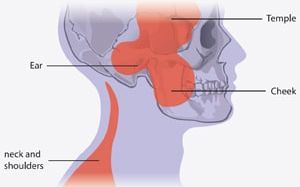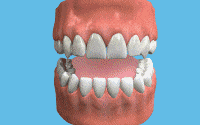Bruxism (teeth grinding)
Clenching and teeth grinding? Everyone deserves a peaceful night’s sleep, talk to a dentist today.

What is Bruxism?
Do you grind and clench your teeth at night while you sleep? If so, you could be suffering from bruxism, a condition which can cause aggressive teeth wear and damage to your jaw joints. Modern research has shown that up to half of Australian adults will have some type of teeth grinding, and around five percent of people are severely affected by bruxism.
Bruxism mostly it occurs during sleep. Most people are affected by bruxism, although not all people generate enough stresses to cause damage. Bruxism can damage to the teeth and jaw joints. The muscle spasm can lead to facial pain and headache. Waking with a headache is a sure sign of bruxism.
The cause of bruxism is not at all clear. It is an involuntary sleep disorder although it has also been linked to medications and allergies. Stress and anxiety are widely known to exacerbate bruxism.
Needless to say, this clenching and grinding is not a healthy or normal action! In many cases, you may not even realise that you suffer from bruxism, since you will have no conscious control over bruxism, particularly when it occurs during your sleep. But if you experience tension-related headaches, painful teeth or jaw joints, or your sleep partner is woken or disturbed by the sound of your teeth grinding together, you should visit Apple Dental for a detailed examination.

Damage to the teeth
Teeth wear down after years of nocturnal teeth grinding. Once the hard outer layer of the teeth (enamel) is worn through, the rate of wear accelerates because the exposed underlying dentine has little resistance to acid erosion and further physical wear. This leads to worn, over-closed bites which can then predispose to inflammatory jaw joint problems. This can be solved with dental work to rebuild the teeth.
Bruxism also causes gum recessions and abfractions, which refers to loss of tooth substance near the gum lines, which often feels like ridges. This can lead to sensitivity and increased susceptibility to acid erosion and tooth decay. Abfractions are easily repaired.
Teeth can also fracture as a result of bruxism forces, resulting in the requirement for treatment or at worst, extraction of split teeth.
TMJ dysfunction
Bruxism can damage the TMJ (jaw joint), resulting in earache pain, clicking of the joints and limited jaw opening. Crooked teeth can make the problem worse, as the teeth force the jaw into unnatural positions. This is why orthodontics can be an important treatment.
Prevention
The only treatment for bruxism is an occlusal splint or night-guard. They are small plastic appliances worn at night to keep the teeth apart. They eliminate further wearing, abfraction, gum recession and fracturing. Also, the thickness of the splint has a positive effect on unloading stresses on the TMJ. Splints often also work well to alleviate morning headaches.
Teeth grinding diagnosis and treatment
Prior to beginning your bruxism treatment we will take a detailed look at your medical history, including any dental or general health problems, medications you are taking, any allergies, and previous jaw surgery or treatment for bruxism.
We then look for problems that may be causing abnormal contact among upper and lower teeth. Once we determine the causes of your bruxism, we can then prescribe appropriate treatment; such as improving or adjusting your bite; changing the behaviour that causes bruxism; and lastly repairing any damage to your teeth or restorations.
If we discover that your bruxism is caused by stress, there are a few strategies we can recommend to help you relax before sleep, such as meditating, listening to music, or exercising. We may also recommend you wear a custom-made protective bite splint while you sleep, to protect your teeth and restorations from being damaged by teeth grinding.
If we diagnose other health problems as part of your teeth grinding issue, we may refer you to a medical practitioner or specialist. If we diagnose your bruxism as being stress-related, we may also recommend stress management and counselling to help alleviate the root cause of your problem.
What are the treatment options to stop teeth grinding?
Treatments of bruxism may include:
- Pain relief for headaches, muscular facial pain, or jaw joint pain
- Muscle relaxant medication for your jaw muscles
- A specialised night guard or bite splint to prevent further damage to your teeth
- Adjusting your teeth for a better fit
- Rebuilding your bite and repairing any worn teeth

Frequently asked questions
Your bruxism may be caused by psychological stress, anxiety or tension; abnormal teeth anatomy, such as ‘high spots’ on fillings; or abnormalities with your jaw joint (temporomandibular joint or ‘TMJ’). In extreme cases, regular bruxism can even cause damage to your teeth, problems with your jaw, facial pain, headaches and other serious side effects.
As part of your regular appointments at the Apple Dental Lane Cove practice, we will assess your mouth for any signs that you may have bruxism, such as teeth which have been chipped, fractured or flattened; tooth enamel which is so worn that your teeth’s deeper layers are exposed; damaged or missing dental restorations; or chewing damage to your cheeks and tongue.
Your bruxism may be caused by either physical and psychological issues, or a combination of both. Some of the main reasons for teeth grinding are:
- Underlying stress, tension or anxiety
- Repressed anger or frustration
- An aggressive, or hyperactive personality
- Misalignment of your upper and lower teeth
- Complications from other medical conditions
- As a side effect of taking medication
There are various symptoms associated with bruxism, which usually reflect the nature of the particular grinding and clenching. If you clench your teeth tightly you may experience tension-related headaches but may have little or no damage to the teeth or jaw joint. Tight clenching alone puts minimal pressure on the jaw joint. If you grind aggressively you may have damaged teeth and jaw joint problems.
Signs of bruxism may vary according to the frequency, duration and strength of the clenching and grinding, but may include:
- Pain and sensitivity to hot and cold
- Noise that is noticed by a partner, friends or relatives, occurring as the teeth are ground together
- Chronic facial pain and tension headaches
- Worn tooth surfaces
- An abnormal alignment of the teeth, caused by uneven tooth wear
- Small factures of the tooth enamel
- Chipped or broken teeth
- Stiffness and pain in the jaw joint that causes limited opening and makes chewing difficult
- Earache – commonly misdiagnosed as an ear infection
In some situations, you may not even realise that you suffer from bruxism, as mild tooth grinding will often display worn teeth surfaces, but no jaw joint pain or teeth sensitivity.

